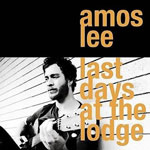
|
|||
|
|||
| Home |
| Gallery |
| Culture/ Technology |
| Fiction |
| Music |
| Poetry |
| Theater |
| What's New |
| About/Contact |
| Archive |
|
Soulful breakthrough Reviewed July 2008
Philadelphia folk-soul troubadour Amos Lee has released two previous CDs that featured spare instrumentation; often just acoustic guitar, standup bass and drums. On 2006's "Supply and Demand," the focal point throughout is his powerful vocals and well-crafted tunes which blend inner-city themes, folk rock, gospel and heartfelt soul. At a time when emo singers put out million-sellers, "American Idol" pretenders ink major label deals, and John Mayer rides in a Rolls-Royce, Lee is a throwback to the day when a guy with a good voice, a guitar and some good songs had a chance to make a ripple in the music business. "Last Days at the Lodge" may be the album that helps Lee make a bigger ripple. This time out, there is a full band behind him on most of the songs, with good production (Don Was) and some old pros in the studio including Doyle Bramhall Jr. on guitar, Spooner Oldham on keyboards, and others. This lineup makes a real impact on the opener (a likely single), "Listen." This is an uncharacteristically churning protest tune featuring some of the spiritual lyric references that make an appearance elsewhere, a sign not of religious preoccupation but of the influence of gospel in his sound: Listen to them churchbells ringin, listen "Won't Let You Go" follows, and is an abrupt return to the mellower sound that is more typical of the rest of the album, brown-eyed soul tastefully played without big production. Here, Lee channels Al Green by gearing up to a falsetto bridge on the chorus. This works and though it sounds like a different singer (and band) than on "Listen," it shows that Lee is willing to take some risks to show his vocal and emotional range. "Baby I Want You" follows, a simple, catchy three-minute confection that might have you racking your mind (and your music collection) trying to find the R&B song he copped the melody from. This song, a good candidate for a single, sounds like Lionel Ritchie when he was rolling out the hits full of hooks, with a better vocal. Lee is back to playing hardball on "Truth" and "Street Corner Preacher"; the first a bluesy threat-down, the next a funky story about an ex-con working the streets of Philly featuring good lyrical wordplay, a sort of ghetto version of Dylan's "Subterranean Homesick Blues": He got two years off for good behavior "What's Been Going On" and "It Started to Rain" are similar breakup ballads that both recall the influence of Bill Withers. While benefitting from background vocals and additional bottom in the arrangements t,hey are not as strong as the other soft songs on the disc, like "Kid," a catchy message about growing up the hard way in the inner city, with some autobiographical perspective. Over a quiet guitar-picking intro, Lee sings: Been kicked around so long you're getting used to how it feels The social commentary on the song "Jails and Bombs" is incongruous to its lighter-than-air arrangement and Al Green/Curtis Mayfield soaring falsetto vocal. It's easy to agree with the sentiments, but Amos Lee is not going to be the next Marvin Gaye. "Ease Back" just doesn't work; banjos and steel guitars don't fit Lee's style, and his voice is off-target here in an ill-advised attempt at crossover pop. He closes out with a soft folk song, "Better Days," a nice blend of social observation which also gives him one last chance to display his excellent pipes. "Last Days at the Lodge" is one of those vocal albums that doesn't follow trends, but succeeds on its own merits. Amos Lee is not a household name, but this album is a unique, interesting, and impressive performance by an artist who is poised to break through to a bigger audience. Review by Frank Kocher, a longtime San Diego resident, musician, music collector and frequent contributor to The San Diego Troubadour. |
Copyright © Turbula.net

